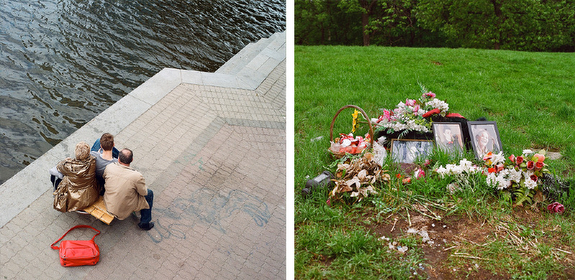
The edge effect rule in ecology: sharp edges between ecosystems are seldom seen, but in transition zones, called ecotones, where environments are more contrasting, biodiversity is higher.
The Moscow River exists “backwards”: the movement happens outside of it, the life around flows by, avoiding the river as if it were a heterogenous element built in the landscape. No swimming, no fishing.
This project, titled The Edge Effect, studies how that effect appears when people interact with the Moscow River. It’s at the contact points where this “biodiversity” appears — new, bizarre behavioral patterns and cultural strata, as if thrown out on the riverside by the current. Observing them, I see a bigger story — about how people behave encountering the unknowable.
— Natalia Pokrovskaya, Moscow, Russia